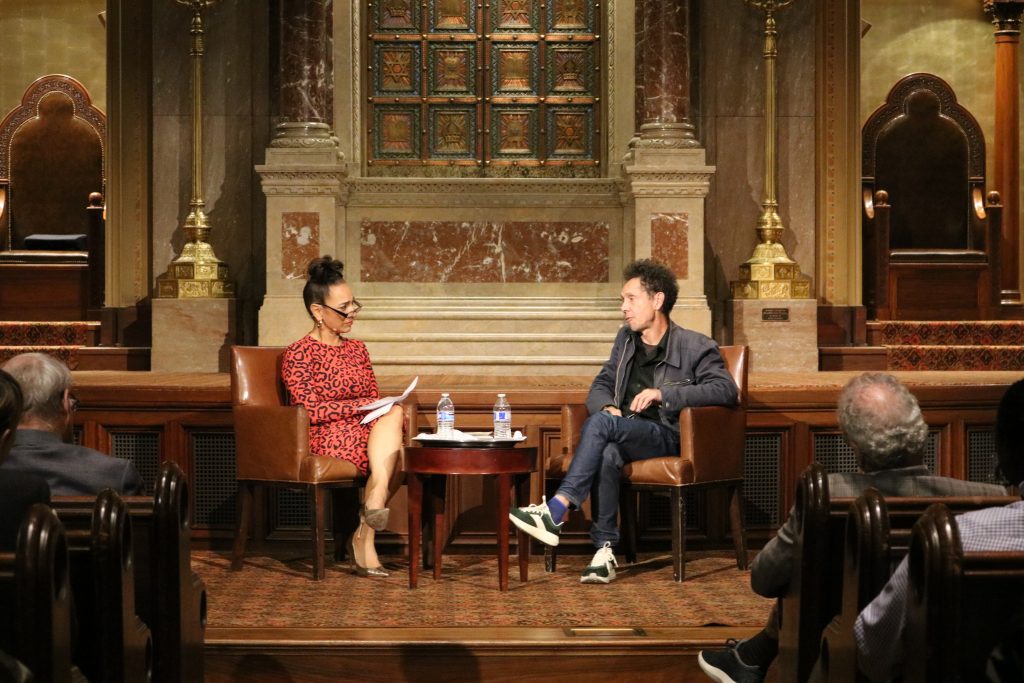
On the evening of Oct. 24, 2024, the Free Library of Philadelphia Foundation welcomed Malcolm Gladwell — author of five New York Times bestsellers and celebrated social theorist—to its prestigious Author Series. Held at Congregation Rodeph Shalom, the sold-out event saw Gladwell engaging in a thought-provoking dialogue with Michelle Miller, award-winning journalist, author and co-host of CBS Saturday Morning. Together, they delved into the themes of Gladwell’s latest book, “Revenge of the Tipping Point,” a thoughtful examination of social epidemics, ideas and trends.
The FLDF’s Author Events program, launched in 1994, has become known as “the region’s preeminent forum for writers and ideas,” hosting some of the most renowned voices in literature and academia. Gladwell’s conversation with Miller was a testament to this reputation, as the two explored not only the insights from his new book but also the broader impact of his work over the past two decades.
“Revenge of the Tipping Point” revisits themes from Gladwell’s groundbreaking first book, “The Tipping Point,” which introduced the idea of social epidemics in 2000. Miller asked Gladwell about his choice of title, and he responded with a characteristic blend of humility and humor; he stated that his first book focused on the positives of social contagion — the thrilling ways ideas could spread and ignite change. But now, he sees the need to examine the flip side. There are unexpected and sometimes devastating consequences that can come with this phenomenon.His new book delves into the darker side of social trends, where innovations and ideas are sometimes twisted or wielded in ways that create profound harm.
This candid assessment reflected a growth in Gladwell’s thinking, and he did not shy away from admitting past missteps. He addressed chapter four, “The Power of Context (Part One): Bernie Goetz and the Rise and Fall of New York City Crime,” on crime from “The Tipping Point,” apologizing for popularizing the broken windows theory (how a lack of order can lead to more disorder) saying, “you have to be willing to admit you were wrong.” He believes that in life, the willingness to learn and to be open to new information is the only way forward – a powerful message for the audience, reminding them that knowledge is a journey and that intellectual humility is key to personal and societal progress.
During the event, Gladwell touched on the importance of remembering and retelling pivotal stories in history. He spoke about the Holocaust, remarking on the tragedy of sidelined narratives, explaining that when we forget or intentionally avoid painful histories, we risk repeating their mistakes, and worse, we deny future generations the chance to learn from them. Gladwell has long advocated for the enduring power of stories — as evident in his book “David and Goliath,” where he explores the resilience and strength found in underdog stories. This theme resonates with young people, encouraging them to embrace adversity as a source of strength rather than a barrier to success.
Gladwell also discussed the COVID-19 pandemic, pointing to the phenomenon of “superspreaders” — those few individuals who unknowingly contribute disproportionately to the virus’s spread, stating that identifying and managing risk without casting suspicion on everyone would be the main challenge. He posed a provocative question to the audience: “Can society handle the idea that not everyone poses the same risk?” His insights suggested that the real challenge is not merely in containing viruses but in learning to view social problems in new ways, fully understanding them before seeking solutions.
In true Gladwell fashion, he concluded the night on a note of hope. “Optimism is not a choice; it’s a necessity,” he told the audience, underscoring the importance of facing challenges with resilience and stride. An eternal optimist, Gladwell believes that, despite the complexities of our world, we are gradually understanding our problems well enough to solve them.
In a world driven by instant information, Gladwell’s approach — asking tough questions and patiently dissecting answers — offers a refreshing model of critical thinking. For college students, reading works like “The Tipping Point,” “Outliers” and “Revenge of the Tipping Point” provides invaluable lessons. His books encourage readers to question everything, to seek patterns and to understand the interplay between individual actions and societal forces.
Reading Gladwell equips young people with “intellectual ammunition,” as he put it, to make sense of their own lives and the world around them. In “Outliers,” for example, Gladwell demonstrates that success is a product of community, timing and circumstances as much as it is of individual effort. For students, this realization can be both empowering and humbling, reminding them that hard work is essential, but recognizing and harnessing opportunity is just as crucial.
In today’s society, where misinformation is rampant and narratives are often oversimplified, Gladwell’s work serves as a reminder of the value of nuance, reflection and the ongoing quest for knowledge. His books do not just inform; they inspire readers to look deeper, to challenge assumptions and to remain curious – skills that will serve them well throughout their lives. The Free Library’s Author Events program once again provided a platform for dialogue that will leave a lasting impact on those who attended. For Gladwell, who described book tours as reminders that “America is full of wonderful people,” the event was yet another example of the connections that fuel his work and his hope for a brighter future.


